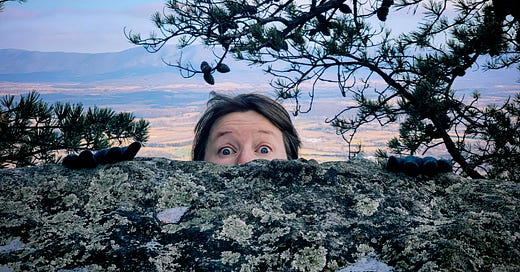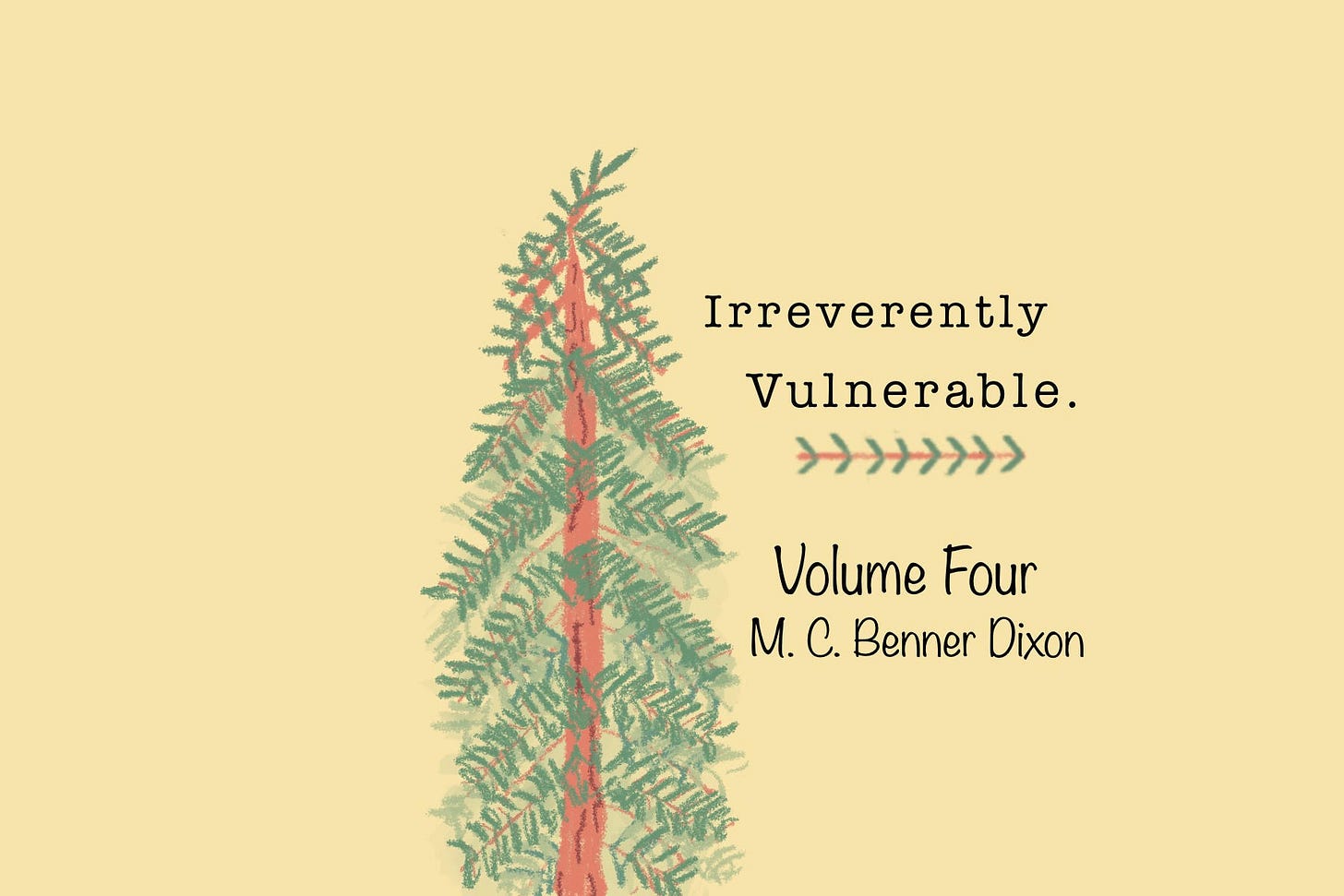Irreverently Vulnerable with Story Conjurer and 'Millions of Suns' Author M.C. Benner Dixon
The 'Millions of Suns' co-author on the need to be seen, being present with other writers, and Romeo and Juliet...in space!
A monthly interview series with creators who discuss their worst fears, their best joys, and what turns them on.
There are so many good adjectives to describe this prolific and weird-in-all-the-good-ways writer who is also a teacher, a collaborator, and an editor who can trim a paragraph like a butcher on Adderall.
M. Christine (M.C.) Benner Dixon is the co-author of the recently released book "Millions of Suns: On Writing and Life” (written with Sharon Fagan McDermott, published University of Michigan Press). She is the winner of the 2022 Orison Fiction Prize, and she is literally a Mark Twain scholar. A Twainian scholar? She also serves as the interim Executive Director for the Write Pittsburgh writing community, a wonderful collective of programs that helps youth grow in their writing craft, and enables adult fiction writers like myself to attend remote speculative fiction workshops.
M.C., thank you. Now, let’s get weird.
This is Irreverently Vulnerable Volume Four with M.C. Benner Dixon.
What book or movie moment evokes an emotion in you that can only be described as “Nerd Glee”?
This is a hard question because I am a very gleeful nerd with a broad range of interests. The obvious choice would be something by Mark Twain because I wrote a whole dissertation about the guy, but I can’t really narrow it down to one Twain book, can I? So I’ll take a left turn and go with The Seventh Seal. Nothing gets my wheels turning quite like an anachronistic Swedish knight playing chess with Death. Seriously, no one should have to watch this film with me. I’m constantly jumping up and down and shouting about how many times this scene or that has been quoted in everything from Bill & Ted to The Animaniacs.
What is a prominent wound you have drawn from and channeled into your writing?
The minute I entered school as a five-year-old I was keenly aware of the fact that social spaces didn’t come naturally to me. I didn’t understand the rules for how to get invited up to the loft in the kindergarten room—you were only allowed to go up in pairs, so you had to make someone like you enough that they wanted to go with you to the loft to play. I spent a lot of time watching the other kids, trying to figure out how they were doing it. But I never felt confident enough to plunge in and try for myself. I spent so much time watching that I became invisible, overlooked. I spent years desperately longing for someone to see me and fearing that exact same thing. I can’t tell you how many stories I have that deal with that issue of being seen—the horror and the honor of it.
What chapter or passage of story have you written that was viscerally emotional for you writing it and stays in your mind?
One of my current works in progress has a scene that is drawn pretty directly from my experience as an adolescent. In the story, the character, Roma, is reading the Bible cover-to-cover and finds some passage in Leviticus that talks about how a menstruating woman is unclean and anyone who touches her is unclean and so on. Roma takes it about as well as I did. When I tell you I wept heart-wracking sobs after reading that, I am not exaggerating. I felt so betrayed. I didn’t choose to be a woman, but here was a stone-cold declaration that my body, which I believed to be created by God, made me repulsive to God. And I know that there are all kinds of theologians who have couched these verses in austere explanations—some more generous to women than others—but I didn’t have access to those interpretations at the time. All I had was my broken heart and my shame, and it still makes me tear up to think about the pain that girl felt because of those words.
You’re gonna create today. What is the thing or things you do beforehand that need to be done before you can write a single word?
This isn’t really a thing for me. I do not have to do a lot of preparation to get me in the writing mood. If I so much as glance at an open file on my computer, I can get sucked in for three hours without a breath. I think I’m writing constantly. When I’m out on a walk, I’m composing without even realizing it. When I’m trying to go to sleep, I’ll slip into the world of my latest project and noodle around. Characters attach themselves to whatever’s in front of me—frying pans and scrub brushes. Loose phrases get stuck in my head. It’s very entertaining in here.
In those quiet moments when you sit in an airport lounge, exhausted and reflecting, what might be on your mind?
Ew, airports. For a lot of reasons (the two main ones being Covid and climate change), I don’t spend much time in airports these days. But they always give me this feeling that I have called (in a poem somewhere) backwards nostalgia. It’s going to be so weird to remember airports, I think, after the apocalypse. We’re going to be all, Remember neck pillows? Remember moving sidewalks? Remember how scared we were of unattended bags?
A cosmic wish-granter has offered you a +25 manna boost in talent and creative willpower, but in exchange, you must personally evict a family of koala bears from their favorite mangrove forest. They must leave behind their life savings of eucalyptus, which Mother Koala had been saving to purchase an authentic 1855 Singer sewing machine. What is your response?
Oh, I’m totally taking the deal, but then with my dazzling new creativity I’m going to come up with a way to thread the needle (so to speak) on this deal so that Mama Koala gets her sewing machine anyhow. Cosmic wish deals always have a loophole.
How do you approach sharing your work? Do you sit on it for 17 months like a brooding seagull, or do you write a draft and release it straight to the ether?
As soon as I’m done with a draft, I want someone to read it immediately. It’s almost as if I’m afraid it’s going to evaporate unless someone else sees it. My niece Kali (she’s 20 years old, by the way, in case you were imagining a little child) has been one of my most faithful first readers, and she’s wonderful because she’s extremely curious but not at all judgmental. But I need to edit a piece several times before I really understand it enough to be able to make use of harsher criticism. Now, once one of my stories or poems is accepted for publication somewhere, I immediately regret everything and plunge into despair. But that passes, and I remind myself that my writing doesn’t really belong to me anymore at that point. It’s a creature of someone else’s mind.
Would you like to tell me about a project you’re currently working on, and why it gives you a little tsunami of excitement to think about it? (This is a non-lethal tsunami – no emotional beachgoers are drowned)
The project I mentioned above (with Roma and the Bible verses) comes from a novel that I have been working on that is essentially Romeo & Juliet—In Space! starring women in their 60s and 70s. I have had so much fun working on this novel! Has Shakespeare in space been done? Absolutely! Gender-bent classics? Yup! But you see, I never wrote this kind of story before, so to me it feels fresh. It’s never really been my objective to do what “hasn’t been done” with my writing. That seems like a bit of a lost cause. Regardless, writing this novel has been a real hoot. I have enjoyed collaborating with and pushing against the ideas of another writer...who happens to have died several centuries ago.
What approach or tool have you found is most helpful in growing your community?
Saying yes. It’s exhausting, and you have to know when to turn it off, but saying yes, showing up, and being present is a great way to exit the isolation that so many writers experience. You just don’t know where it’s going to go. I signed up for an online workshop with Write Pittsburgh in the winter of 2020, and now I’m serving as the interim executive director of the organization, and I’m meeting all kinds of amazing writers and artists. It really helps to believe that creative work is not a competition. The more people there are writing great material, the more interest there is [in] great writing. Our peers are our audiences and our collaborators. The goal is to end up in the company of writers, not to hurdle over them.
You’re given the opportunity to shadow a family of fantastical creatures for a week. Like Trading Spouses – this is gonna air on Bravo. What creature do you embed yourself with and why?
Make it ents, and make it century. I want time to slow down. I want to shepherd trees. It’s going to be bliss.
Describe a time when Life had you in a headlock giving you unstoppable noogies, and you threw it off and slapped it and told this Life bully fella to go eat poo.
My first year of teaching was brutal. I actually write about it a bit in my essay on memory in Millions of Suns. There were fistfights in my classroom. I had students screaming in my face. The hours were ridiculous. By January, I was having week-long migraines. I was angry and scared and frustrated and embarrassed. I was drowning. I finished out the year, but I did not renew my contract. Instead, I ran straight to the comforting arms of grad school (because nothing says taking it easy quite like getting a doctoral degree, am I right?). I’m not sure I consider this a victory on my part. Don’t get me wrong, I am very glad about everything that came from that decision (i.e., the rest of my life), but I missed a lot of opportunities to do better for my students and for myself. The fact that I didn’t succeed in that setting wasn’t entirely my fault. I know that. But I was not an innocent victim, either.
A giant smoldering piece of Ellio’s Pizza is hurtling toward Earth, not even fully defrosted, and it’s too late to do anything else. What is the line you utter just before it strikes and what song do you play?
I’m either going to be expounding on how this is precisely why homemade pizza is so much better than frozen and trying to show someone the beautiful patina I’ve developed on my pizza stone . . . or I’m quoting Emily Dickinson. It’s 50/50.
The song, without a doubt, is “Killing the Blues” from the Raising Sand album by Robert Plant and Allison Krauss. Dying to the sound of a steel guitar seems absolutely correct.
Explore more of M. Christine Benner Dixon at her website here. Or go ahead and check out the brand-spankin’-new “Millions of Suns: On Writing and Life”!
I’m so glad you came along for this conversation. If you’d like to support Stomp Roams, you can share the post or tap that little “subscribe” button. Learn more about the author at www.jonathandelp.com.
How deep into this world do you want to go? Read Volume 3 of Irreverently Vulnerable With 'Like The Sun Holds The Moon' Author and Philly Mixed-Media Artist J. Eliza Wall.









